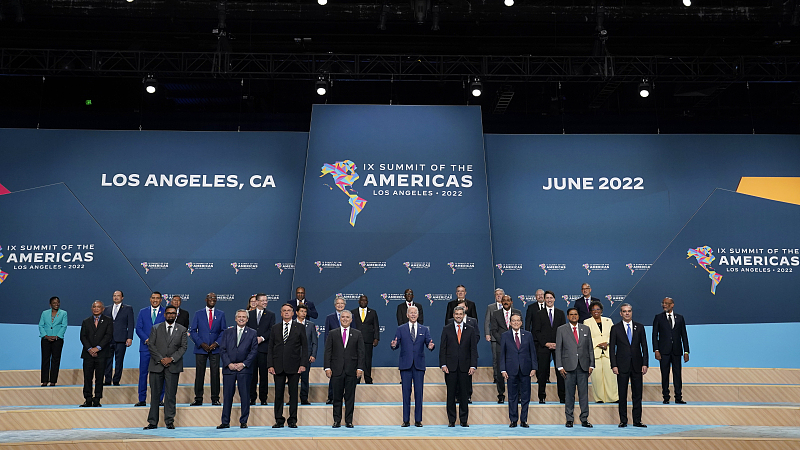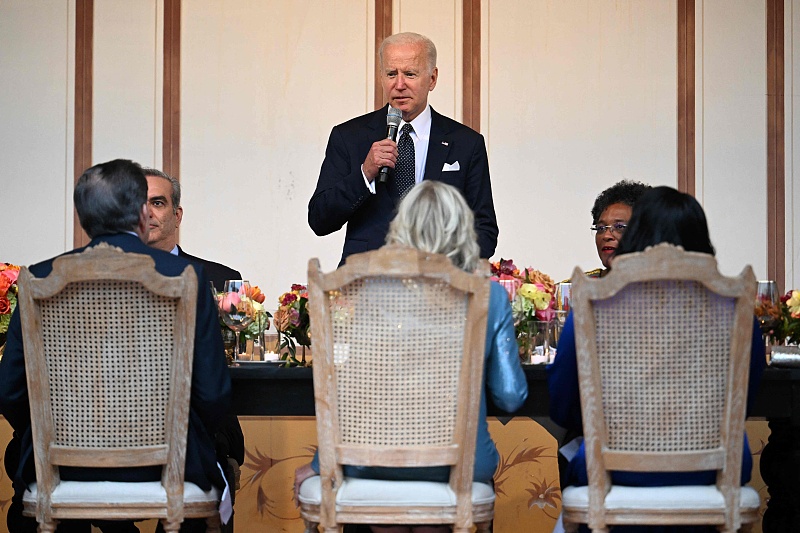
U.S. President Joe Biden (C) motions as he participates in a family photo with heads of delegations at the Summit of the Americas in Los Angeles, June 10, 2022. /CFP
U.S. President Joe Biden (C) motions as he participates in a family photo with heads of delegations at the Summit of the Americas in Los Angeles, June 10, 2022. /CFP
Editor's note: John Gong is a professor at the University of International Business and Economics and a research fellow at the Academy of China Open Economy Studies at UIBE. The article reflects the author's views and not necessarily those of CGTN.
After a long hiatus of over four years, the 9th Summit of the Americas finally took place in Los Angeles, U.S. It opened with signs of discord almost at the very beginning, as U.S. President Joe Biden's decision to not invite three countries to attend, Cuba, Nicaragua and Venezuela, caused an outcry from several country leaders of the region, including personal boycotts from leaders of Mexico, El Salvador, Honduras and Guatemala, and a harsh criticism by Belize Prime Minister Johnny Briceno who attended the summit.
Nevertheless the summit did appear to have achieved some results in spite of all the controversies, the most important of which is the agreement over Washington's proposal of a new economic cooperation partnership for the region, called the Americas Partnership for Economic Prosperity (APEP).
The APEP is not a regional free trade agreement, nor an investment agreement, as it contains scantly anything about tariff or non-tariff trade barriers, or other traditional trade treaty-related issues.
Neither does it contain anything concretely actionable – at least not so far – that can be implemented and enforced by signatory countries. It is probably more like taking a few more steps over a joint diplomatic statement in a multilateral regional context for a set of political-economic goals.
According to the White House official statement, "The Americas Partnership for Economic Prosperity will rebuild our economies from the bottom up and middle out."
It is apparent that the details of the APEP are still in the making, as the White House press release says that it will hold initial consultations with partners in the western hemisphere and stakeholders. But it does lay out several areas of focus, for which some of my comments are attached below:
On reinvigorating regional economic institutions and mobilizing investment, Washington will leverage the existing economic institution, the Inter-American Development Bank in this case, to, among other things, drive private sector investment.
This is an old trick that has been tried before, and in the United States as well as purportedly for the developing countries infrastructure investment initiatives spearheaded by the U.S. Washington is fond of peddling this kind of public-induced private investment idea, but how effective it is remains to be seen.
On making more resilient supply chains, this agreement appears to be able to bring some sourcing opportunities to the region, such as the Gap Inc.'s pledge to increase its sourcing from Central America to $150 million by 2025, according to CNN. Diversifying the supply chain are buzz words these days in a climate of anti-globalization sentiment as a result of the COVID-19 pandemic and the conflict in Ukraine.
On soft infrastructure, the agreement will explore "broaden participation in the formal economy", including tax and anti-corruption measures, as well as areas such as migration, education, health, unemployment and retirement, childcare, and women's economic empowerment. These are all traditional Democrat rhetoric, but probably the most important issue regards illegal immigration to the U.S.

U.S. President Joe Biden (C) speaks during a dinner with heads of state, government and their spouses as part of the Ninth Summit of the Americas at the Getty Villa in Pacific Palisades, California, June 9, 2022. /CFP
U.S. President Joe Biden (C) speaks during a dinner with heads of state, government and their spouses as part of the Ninth Summit of the Americas at the Getty Villa in Pacific Palisades, California, June 9, 2022. /CFP
On clean energy, de-carbonization and biodiversity, the agreement will accelerate clean energy technology, more sustainable forest conservation and management, and low emission and resilient agricultural practices.
These are also traditional Democrat rhetoric, or more appropriately, Biden's personal rhetoric. But setting aside that, I wish him and Washington all the best in terms of achieving these goals in Latin America.
The final piece appears to be straight from the Indo-Pacific Economic Framework (IPEF), regarding how to better cooperate on customs facilitation, advance transparency and good regulatory practices, pursue high standards on the digital economy etc. These are topics somewhat related to trade. Latin America does have a lot of room for improvement in areas currently impeding trade.
Overall the APEP has some merits in terms of Washington playing a leadership role in bringing an inclusive and progressive growth agenda to the region, which has been neglected, if not messed around, for a long time by Washington.
But it is also hard to imagine this strategy being totally unrelated to the grand competition against China. One of the Biden Administration's foreign policy hallmarks is based on building alliances around the world. Hence we see enhanced cooperation with Europe, particularly against the backdrop of the conflict in Ukraine. In Asia, Washington's bet is IPEF, of which its counterpart in Latin America is APEP.
There are certain things in APEP that are clearly meant to be targeting China, as opposed to following free market forces. For example, the supply chain resilience and diversity issues have been alleged since the COVID-19 outbreak, even though China, being a major source of global supply chain, weathered through it quite successfully such that the supply chain was only affected for a few days even during the height of the pandemic. Last month's robust exports figure also illustrates this point.
In short, cooperation is the priority for China-U.S. relations, the resilience of Chinese economy has shown the world that it is impossible to contain China in whatever means, including APEP.
(If you want to contribute and have specific expertise, please contact us at opinions@cgtn.com. Follow @thouse_opinions on Twitter to discover the latest commentaries in the CGTN Opinion Section.)

